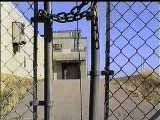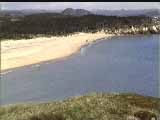JOIN HANDS WITH BURGEO

This page was first created in April, 1997. The fish plant in Burgeo
had been locked shut
for five years. On April 24, 1997, about half of the population of the town did join hands and walk though the town. Whether or not this display of concern had anything to do with it, the plant did re-open last fall in a very reduced capacity. But in June, 1998, the story continues and some people are beginning to ask what kind of game Seafreez is actually playing in Burgeo.
Families of Burgeo want to save their community
First of all, this is not a demonstration - whatsoever. We are not
protesting against "any individual". In fact, we have contacted the
fish plant owner, Bill Barry, to assure him of this and to invite him to
join in. But we are protesting to save our community.
We want to bring the situation to the attention of the government,
the public, Newfoundland and the rest of Canada.
Exactly five years ago to the date - April 24, 1992 - was the last day
of production at the Seafreez plant in Burgeo. Since that date we have
seen nothing to indicate that our fish plant is going to open anymore.
We feel that this has been a sad time for the people of Burgeo. Not
just the ones who worked there but everybody is suffering. Not only
financially but emotionally as well.
Families are leaving; every week we see more and more empty
homes. Our young families are going looking for work and they are
opur future. Worse still, what happens to the middle aged, the
seniors, and all others who have settled here in Burgeo? The majority
of these people feel that it is no good to go away, who will hire them?
What work can they do? How will our town survive, if all we see is
out-migration, a still fish plant and businesses closing?
We strongly encourage everyone - every man, woman and child - to
join hands around our town to show the world that we want to stay.
We love it here,and we have every right to stay to raise our families
here and to retire here. Let us show the world that we are families
for whom the government couldn't care less about. Do they really care
if the fishplant ever opens? Or if 10 people or 1,000 go to work? NO!
They don't even know that we are alive.
We need enough people to make a circle with everyone holding hands
around the main route in town. The more people, the bigger the circle
will be.
We would like you to wear dark clothing, black if possible, like a day
of mourning. Come to the Anglican Church at 3:30 p.m., on Thursday,
April 24, 1997, where we will be led in prayer by Rev. Byron Barter and Rev.
Marilyn Avery. We will then proceed by holding hands to form a human
chain around the town. (From the Burgeo Chamber of Commerce)
Send a message of support to the people of Burgeo.
June 3, 1998
More than 1,000 people turned out in Burgeo to support the demand for a new program to replace TAGS.
Dave Cooper, also program director with the Burgeo Broadcasting System, reported on the demonstration for The Georgian.
He wrote that two days earlier about 500 residents had endorsed the position of the local Union executive and Chamber of Commerce by taking over offices of the department of fisheries and oceans and Human Resource Development Canada. They also shut down the fisheries vessel.
The whole community apparently closed down on Wednesday afternoon in support of the demonstration.
Burgeo
Burgeo, the major centre on the sou'west coast of Newfoundland, was
only connected by road to the rest of the province in the 1980s. Found
on Portugese maps as early as 1628, it was originally settled by
fishermen.
The town is known throughout the province as the origin of the
resurgence of the union movement during the 1970s. Burgeo was a
resettlement growth centre during the 1960s. With a large, modern
fish plant, its people prospered until 1992, when the plant closed
because of conflict between the union and the new owner, Bill Barry.
Soon after, the cod fishery closed and many townspeople depend on a
federal compensation package for cod fishermen and plant workers
(TAGS). The federal government now claims that it underestimated the
number of people who would qualify for compensation. It has
announced that all retraining and compensation packages are ending
a year earlier than the people anticipated.
There is great potential for adventure and soft adventure tourism on
the sou'west coast of Newfoundland, but it would seem that
reopening the fish plant is the only hope for Burgeo. Last year the
union replaced its executive, reopened negotiations with the
absentee plant owner, and signed a contract for partial reopening of
the plant. The people repaired the plant as unpaid volunteers.
Burgeo was the first town in Newfoundland, if not Atlantic Canada,
where residents collectively own and operate their own cable
television system. Since the mid-80s, the Burgeo Broadcasting System
has produced its own local news and programming.
The former program director of BBS, Dave Cooper, was the local contact for

Burgeo appeared on Portugese maps as early as 1624.

Sandbanks Park, miles of pristine, white beach, is Atlantic Canada's
best-kept secret.

The Burgeo hospital, built only a few years ago at a cost of more than
$9 million, is also threatened with closure. Burgeo's previous hospital
was built in the 1930s.
Communication for Survival



